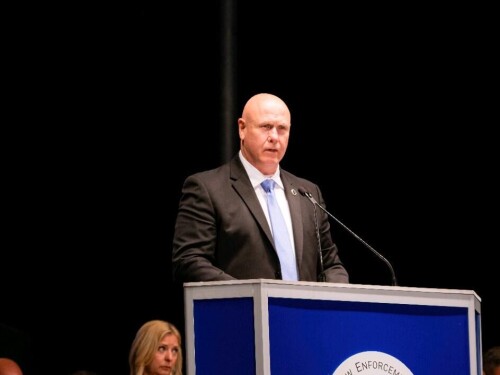If you’re a young Turk, forgive me for getting philosophical in my old age. I find myself contemplating death — a lot. I’ve begun reading the obituaries. Even if I don’t know the names (though more are becoming familiar), I check how many were my age or younger. Forgive me — and then remember me when you get older and start doing the same thing.
In our country, death is hard for most people in the bloom of youth to relate to. There are the rare car accidents, childhood cancers, and drug overdoses. But for much of the general population, death is an old person’s game. If you’re a police officer, however, you’re made very aware of death — beginning in the academy and then on the job.
Most Americans try to block out both the awareness and experience of death. That’s not an option for police officers. I watched that somber realization dawn on recruits at the Alaska DPS Academy, where I was a guest instructor for over 20 years.
I saw it happen with every class, but never more poignantly than in 2010. That year, two police officers — Sergeant Anthony Michael “Tony” Wallace, 32, and Officer Matthew Dean “Matt” Tokuoka, 39, were shot and killed in an ambush in Hoonah, Alaska. They made up half of the police force.
Hoonah is a Tlingit community of fewer than 800 people, located on Chichagof Island off the coast of Juneau. It’s accessible only by air or water. In 2010, I joined the recruits, academy staff, some of their spouses, local law enforcement and Coast Guard members as we boarded a vessel around 0430 for a five-hour trip to Hoonah to attend the officers’ funerals. A Juneau Empire reporter described the scene.
Hundreds lined the deck of the ferry terminal waiting for the Alaska Marine Highway System to arrive from Juneau with the officers’ remains. More waited at the terminal gates. Still more stood along the streets and filled the local school gymnasium as the families of the two officers and accompanying law enforcement personnel arrived, along with the urns.
The gymnasium was standing room only. The academy staff and I sat in the bleachers with law enforcement from around the state. We were joined by Royal Canadian Mounted Police and American peace officers from the “lower 48.”
Just before the remains of Officers Wallace and Tokuoka were brought in, the recruits were seated at the front of the gymnasium alongside the many dignitaries. It was fitting. They bore witness to what the path they had chosen could ask of them.
The service provided laughter amongst the tears as family and village members shared anecdotes of happier times. Tony and Matt were beloved and the service was both celebration and mourning.
The long boat ride back to Sitka that night was subdued. I could only try and imagine what the recruits were thinking. We docked late at night.
At 0800 the next day, the recruits were scrubbed, fresh-faced and uniformed for another day of my instruction on the Alaska Criminal Code. This after they’d gotten up for an early morning run. I tried to be worthy.
Years ago, I read a book by Michael A. Singer called “The Untethered Soul: The Journey Beyond Yourself.” I copied passages from it into one of the many blank books I’ve filled over the years.
Amongst them was this: “Death is the greatest teacher in all of life. Take a moment to look at the things you think you need. Look at how much time and energy you put into various activities. Imagine if you knew you were going to die within a week or a month. How would that change things? How would your priorities change? How would your thoughts change? Think honestly about what you would do with your last week. What a wonderful thought to contemplate. Then ponder this question: If that’s really what you would do with your last week, what are you doing with the rest of your time? Wasting it? Throwing it away? Treating it like it’s not something precious? What are you doing with life? That is what death asks you.”
I know what officers do with their lives. They’ve allowed me to walk humbly in their shadows for nearly 40 years — as a state and federal prosecutor, law enforcement trainer, writer and friend. At my age, I’ve come to believe that true success lies in loving well and living a life of purpose and meaning.
That’s what officers do.
If you’re wondering about the love part, permit me to quote John 15:13: “Greater love has no one than this: to lay down one’s life for one’s friends.”
I’m not about to argue with the Bible but permit me to suggest that policing demands an even greater love — one that prepares officers to face death for strangers.
For the willing student, death teaches us to embrace and appreciate life in all its wondrous details — the cry of an infant, the laughter of a child, the hand-holding shuffle of old-time lovers, fresh rain, autumn leaves, a star-studded darkness.
For police officers, their willingness to face death to protect strangers teaches them the greatest love of all. After nearly 40 years of bearing witness, I can say without hesitation: they are stellar and noble students.
As we commemorate National Police Week and solemnly remember those who have been killed in the line of duty, we present this memorial poem by Police1 columnist Dan Marcou.








